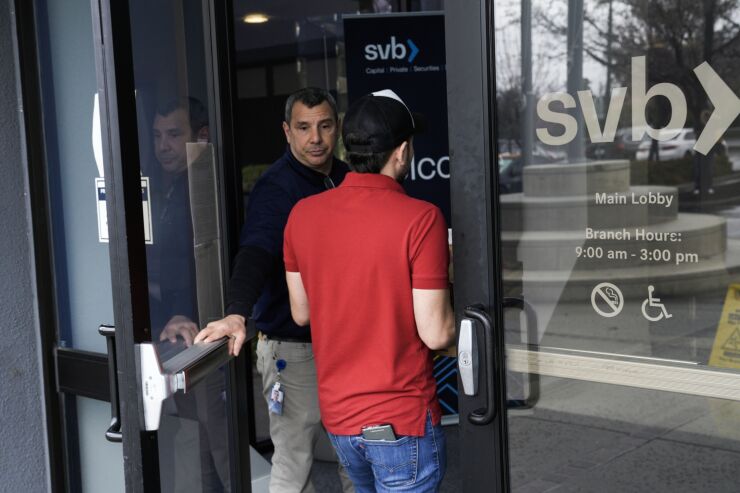Thousands of private wealth clients at imploded Silicon Valley Bank will get all of their money back, a surprising and unusual outcome in the collapse of a U.S. financial institution.
Under Federal Deposit Insurance Corporation rules, bank depositors are insured to $250,000, with amounts over that amount almost never recoverable — a serious worry for the failed bank's affluent customer base. But late Sunday, the Treasury Department, FDIC and Federal Reserve took the unusual step of announcing that depositors from individuals to businesses would recoup 100% of their money.
"Depositors will have access to all of their money starting Monday, March 13," a
The highly unusual relief came as regulators scrambled to stave off financial contagion after SVB Financial Group, Silicon Valley Bank's parent in Santa Clara, California, was
Depositors can now breathe a sigh of relief. So can companies like streaming service Roku, which
But despite Sunday's sudden move by regulators, the cratering of the nation's
Specifically, the collapse has raised questions over whether SVB and its wealth management units will find a buyer. It has also ignited a scramble by financial advisors to find new jobs, industry insiders say.
Regulators started an auction for SVB Financial on Sunday afternoon, with final bids due by March 13, Bloomberg reported, citing people familiar with the matter. The bank had $209 billion in assets and $175 billion in deposits at the end of last year
Money, money, money
The failed $200 billion lender to technology companies and venture capital firms had three affiliated asset managers and one broker-dealer: SVB Asset Management and SVB Wealth LLC, both SEC-registered investment advisors, and bank and broker-dealer SVB Investment Services, which also functions as a registered investment advisor.
Many wealth management clients appear to be founders and managers of tech startups and private investment funds who use the bank's family office, estate planning and "
More than 3,000 individual clients of SVB Wealth had a collective
More than 500 clients at SVB Investment Services had nearly $1.4 billion in assets, including $1.3 billion owned by high net worth individuals. It also managed $63 million for endowments.
Cash sweeps
Concern ran high for clients at the bank's affiliated wealth managers and broker-dealer because those entities appear to have had the option of sweeping clients' cash balances in checking, interest-bearing savings and money market accounts to Silicon Valley Bank, rather than to a third-party custodian, law firm Morgan Lewis wrote
Peter Nesvold, a New York-based investment banker and partner at Republic Capital Group in Houston, said March 13 that there was "an unusually high percentage of cash balances that are unsecured and uninsured at Silicon Valley Bank."
One advisory unit,
Genevieve Roch-Decter, a chartered financial analyst,
Saved
FDIC rules say that
Next up are the FDIC's administrative expenses for sorting out the blow up, followed by consumers with insured deposits, covered up to $250,000 per investor. Then come consumers with uninsured deposits, followed by general creditors and stockholders. The latter two groups typically recoup little, if anything.
Any takers?
Silicon Valley Bank fell apart
Amid the run up to the implosion, SVB was without a chief risk officer for much of 2022,
Concerns about collateral damage grew as the bank's tech startup clients
Now, regulators' efforts to offload the bank could be a tough sell, Nesvold said. Bank regulators typically want things to go to one buyer, not piecemeal, which means that whoever might want the wealth management units would also have to take the failed bank.
"I think given the sense of urgency to stabilize the financial system, the FDIC is really going to make sure this (SVB) goes to one buyer, not buyers," he said.
Advisors scramble
Meanwhile,
"I'm hearing in the market that there's a ton of recruiting activity going on," Nesvold said. "So if wealth management firms can't acquire (just) the Boston Private Bank asset" — a crown jewel in SVB — or other RIAs or the broker-dealer, "maybe they can hire away some of the talent during this period of instability."
Silicon Valley Bank
Meanwhile, investment funds that use SVB as a custodian will likely be looking for new providers.
A 46-page list of mostly obscure venture capital and private equity funds for which Silicon Valley Bank is custodian and that was obtained by Financial Planning shows hundreds of nine- and 10-figure private funds. The list was compiled by Castle Hall, a database company headquartered in Montreal for the global investment industry, from Form ADV filings. Nine funds run by private equity firm Banyan Capital Partners used the bank as custodian, one with $6.6 billion in assets as of June 2022, the largest fund in the list.









